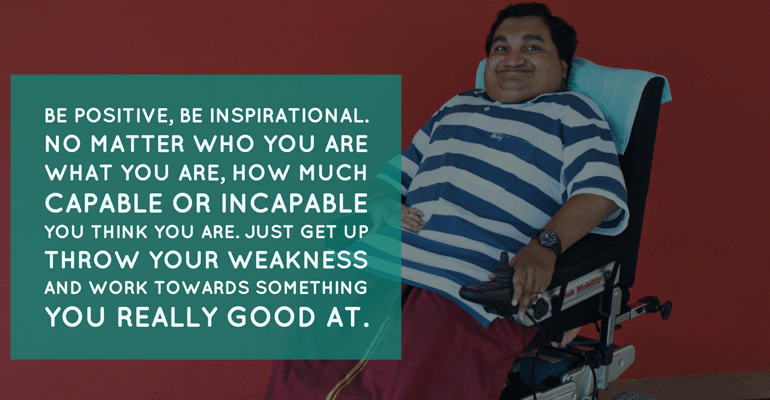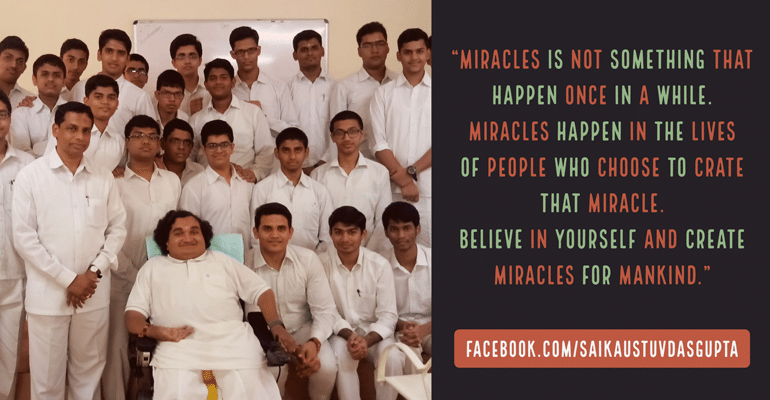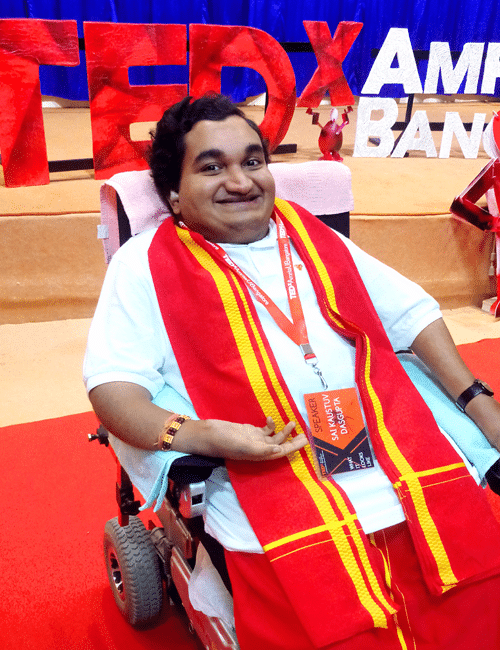Legendary physicist Stephen Hawking once said, “It’s also important not to become angry, no matter how difficult life is because you can lose all hope if you can’t laugh at yourself and at life in general.” And it has become the motto of this 27-year-old wheelchair warrior from Siliguri, West Bengal.
In a candid conversation with Life Beyond Numbers, Sai Kaustuv Dasgupta, who is 90% differently abled says, “For me, disability is just like our weaknesses, we all carry it with ourselves, but we can beat it with our best abilities.”
What makes this man a multitalented wheelchair warrior? He is a well-known graphic designer, composer, singer, entrepreneur, motivational speaker, happiness coach and there is definitely a lot more he is yet to explore.

“I was 1-2 years old and I used to love dancing as a child, particularly Kathak (an Indian classical dance form). It used to give me immense joy and satisfaction. I also loved mimicking the actors back then. There were few fractures back then as well, but my parents couldn’t figure out, what was happening to me. I looked perfect from outside and I was literally broken from the inside.”
Sai’s first fracture happened when he was just 3 and half months old and the number of fractures kept on increasing since then. Failing to understand the situation, his parents took him to Kolkata where doctors told them that he was suffering from a rare disease called Osteogenesis Imperfecta, which is an extremely rare condition and is also known as Brittle Bone Disease.
When he was a child, there was no trace of the disease but suddenly everything was different for him. “When you are that young, it is difficult for a child to understand that he is not normal but a special child. You don’t know what to feel. It is not an easy feeling to cope up with. 3-4 fractures a year was normal for me. I had numerous fractures till date, but after 50, I have stopped counting,” says Sai.
Even during his school days, his happiness used to turn into ashes. Sai mentions an incident from his school days when he secured the first position in his class and a friend came forward to shake his hands. The only thing he remembers next is that he had a fractured hand after that. “Fractures were very unpredictable in my case, I never knew when it was going to happen and that was the scary part. It is difficult to accept when you live a colorful life at first and then shift to black and white.”
His mother Shila Dasgupta used to teach at the same school he was enrolled in so that she can also take care of him. Whenever Sai had to change school, she had to leave her job too.
“I think my family has done everything possible for me throughout. They never cried in front of me or treated me like a burden. They completely accept me and love me for who I am and I am thankful for that.”
Impolite behavior and cruel judgments have not spared him. Sai says, “Not everyone, but there are certain people who used to judge me for my weight. Due to my condition I was extremely thin and opting for a healthy diet or supplements was of little help. Few people used to taunt my parents saying, “You both have your children’s share of food as well? Doesn’t he get anything to eat?” Even though they were not aware of my condition, it was very hurtful to me at times.”
On asking about how he deals with his problems on a daily basis, Sai says, “It is not like there is a sudden crisis in my life, I am facing problem every single day and moment. I am confined to a chair, one hand and one finger functions, that’s all.”

There is a mindset that prevails in our society that disabled people are less productive and therefore private sectors and few government sectors as well are skeptical about hiring them. “When people see a person confined to a wheelchair, they feel that I won’t be able to live up to their expectations,” says Sai.
“As a graphic designer, when I create designs, there is nowhere written that it is done by a 90% disabled person. It is just like everyone else’s work. I have worked for a few multi-national companies and also for NGOs as well. I feel equal minds are required in these sectors.”
Due to multiple fractures, Sai was confined to bed from 2009-2015. “I couldn’t watch the sun rise or set, it was very difficult for me. It broke me down from inside. There is no word in the English dictionary that can explain the emotional crisis I was going through.”
Sai’s life is like the magic life of Butterfly- a caterpillar goes through the transformation, becomes a pupa and then when life seems to end, it changes into something so beautiful as a butterfly.
Similarly, when hope was diluted with fear and despair in Sai’s life, he thought to pen down his incredible story and in 2015, his book- My Life, My Love, My Dear Swami was published, which he wrote in 2 months and consists of 52 pages. It will surely make a difference when we say, he wrote this book with his only functioning index finder, a virtual keyboard, and a mouse. Isn’t this just extraordinary?
The book has also received appreciation from PM Narendra Modi and a thank you letter was sent from Prime Minister’s office, New Delhi. Now the book is published in 9 languages and a teacher from Jadavpur University has translated it into Bengali– “Amar Praan, Amar Prem, Amar Priyo Bhagoban”.
“I would be lying if I said, I never felt sad or insecure. But in those situations, instead of stepping back, I used to think about people who draw inspiration from me and that gives me strength.”
Sai has been to TED Talks as well and his speech has inspired millions of people. He is the 4th global icon after Helen Keller, Stephen Hawking, and Srikanth Bhola, who proved that physical deformity has nothing to do with leadership. He says, “if you keep complaining about your life, you will never have contentment. It is like having a Samsung phone but always longing for an i-phone. The expectations will never end and it will keep on increasing. So, you need to focus on what you have now and the best you can do with your abilities.”
Sai has traveled to 6 foreign countries virtually and people love to listen to his speeches. Through Skype, he was able to join millions of people in the US, New Jersey, Malaysia, Thailand, Singapore, and Nepal.
When asked about the need to promote equality in the society and see the abled and disabled people through the same lens, Sai says, “It should begin right from childhood. Children should be taught to respect people for who they are and not how they look like. This will form a better society where all of us can grow together and only then compassion will replace sympathy.”
“Be it a heart patient in a wheelchair going to a post-office or a visually-impaired person using the lift in a shopping mall, they cannot travel without assistance. I have seen places, where it is mentioned ‘wheelchair area’. At times, I feel so humiliating because like others, I also like to be a part of the crowd when someone picks you up from there to show you are different, it is cruel.” Sai says.
“Same with the movie theatres. Don’t disabled people love to watch movies? They do! But, a brand which spends millions to perfect the screens and seating space and looks after all the needs of a fully abled person, can’t they build a ramp too? So that people like us can go and enjoy?“, asks Sai.
Consider yourself a blessing and not blunder. Happiness should be the limelight of our lives, there can be nothing more important than this and we should start by looking at ourselves. You have to greet the problems and beat it in the best possible manner.
Sai firmly believes that “Finding the purpose of life in your own time and space is important, you should not run your race while looking at others and complaining. I don’t let my 90 percent disability hinder my growth. I have overcome my problems with courage and have made my life simpler and easy to live.”

Till date, Sai has received 44 awards and that includes Winner of All India Wheelchair Wanderlust Competition 2016 and Limca Book of Records 2018. He has also etched his name in Asia Book of Records 2018 for Fastest Typing Speed (24 words per minute) with one finger of left hand. Currently, he is doing a research on how to make India disabled-friendly and more accessible to happiness.
If this man with 90% disability has 100% ability to live life to the fullest, think positive and inspire others to choose happiness over pain, then what’s holding you back?

